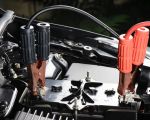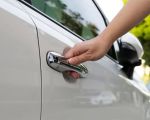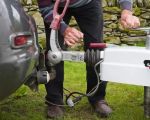- What You Need to Jump Start a Hybrid Car
- Safety First When Jump Starting a Hybrid Car
- Step-by-Step Guide to Jump Starting a Hybrid Car
- Common Mistakes to Avoid When Jump Starting a Hybrid Car
- When to Call for Help
1. What You Need to Jump Start a Hybrid Car
Jump starting a hybrid car might seem tricky because these vehicles have both a gasoline engine and an electric motor. However, the process is similar to jump starting a traditional car, with a few additional considerations due to the hybrid system. Here are the essentials you’ll need:
- Jumper Cables: High-quality jumper cables are essential for a successful jump start. Make sure they are long enough to reach both vehicles' batteries.
- Another Vehicle with a Fully Charged Battery: You’ll need another car with a fully charged battery to provide power to the hybrid's dead battery.
- Personal Protective Equipment (PPE): Gloves and safety glasses are important for protecting yourself from sparks and acid exposure while handling car batteries.
- Owner's Manual (Optional): It's always a good idea to check the owner's manual for any specific instructions related to your particular hybrid model before attempting to jump start.
2. Safety First When Jump Starting a Hybrid Car
Before jumping a hybrid car, safety should always be your first priority. Unlike traditional cars, hybrids have both high-voltage battery systems and standard 12-volt batteries, which increases the complexity of safely jump starting the vehicle.
Here are a few crucial safety precautions to take:
- Turn off all accessories: Make sure that both vehicles have their engines off, and all accessories (such as radios, air conditioning, and lights) are turned off. This minimizes the risk of electrical surges.
- Check the hybrid battery status: Hybrid cars are equipped with a high-voltage battery system. Always check the manufacturer's instructions to determine where and how to safely connect jumper cables to avoid damaging the vehicle’s high-voltage components.
- Do not touch the battery terminals: Hybrid batteries can store a lot of energy, and a misstep could lead to an electrical shock. Always avoid touching the terminals directly with your hands or metal objects.
3. Step-by-Step Guide to Jump Starting a Hybrid Car
Now that you've gathered all the necessary tools and taken safety precautions, follow these steps to safely jump start your hybrid car:
- Position the Vehicles: Park the working car close enough to the hybrid car so that the jumper cables can reach both batteries. Ensure the vehicles are not touching.
- Connect the Jumper Cables: Start with the red (positive) jumper cable. Attach one end of the red cable to the positive terminal of the dead hybrid car battery, then connect the other end to the positive terminal of the working vehicle's battery.
- Attach the Negative Cable: Now, attach the black (negative) cable to the negative terminal of the working vehicle's battery. For the hybrid, instead of connecting the negative cable directly to the battery, attach it to an unpainted metal surface on the hybrid's engine or chassis. This helps avoid a spark near the battery.
- Start the Working Car: Start the engine of the working car and let it run for a few minutes. This will provide power to the hybrid's battery.
- Start the Hybrid Car: Attempt to start the hybrid. If the car starts, keep it running for at least 20 minutes to ensure the battery has enough charge.
- Remove the Jumper Cables: After the hybrid starts, carefully remove the jumper cables in reverse order: first the black cable from the hybrid, then the black cable from the working car, followed by the red cable from the working car and finally the red cable from the hybrid.
4. Common Mistakes to Avoid When Jump Starting a Hybrid Car
Jump starting a hybrid car is straightforward, but there are some common mistakes that can cause issues. Avoid these pitfalls to ensure a safe and effective jump start:
- Incorrect Cable Connections: Always connect the cables in the proper order: positive to positive first, then negative to negative. Improper connections can cause electrical damage or even lead to a fire.
- Using a Damaged Set of Jumper Cables: If your jumper cables are frayed or damaged, they may not conduct electricity properly and could spark or even melt. Always check the cables before use.
- Jumping Too Quickly: Don’t rush the process. Give the working car’s engine a few minutes to charge the hybrid’s battery before attempting to start the hybrid car.
5. When to Call for Help
If your hybrid car does not start after following the above steps, or if you're unsure about the process, it might be best to call for professional assistance. Sometimes the issue is not the battery but a deeper electrical or mechanical problem that requires expert attention.
In cases where you're unsure or feel unsafe performing the jump yourself, contacting a towing or roadside assistance service is a wise choice. Rescue & Towing offers emergency services and can assist you with jump starts or tow your vehicle to a service center for further diagnostics and repairs.





























